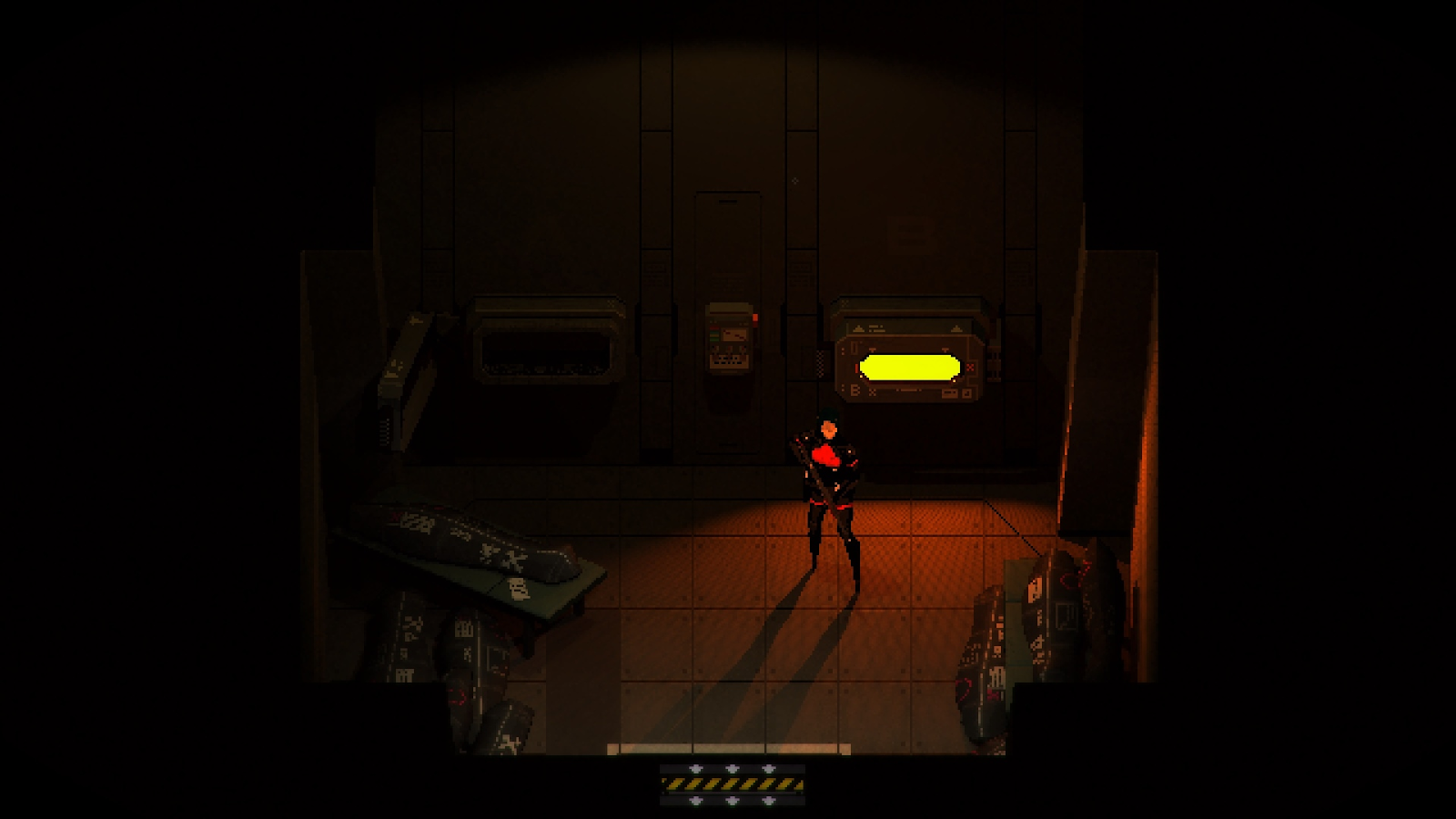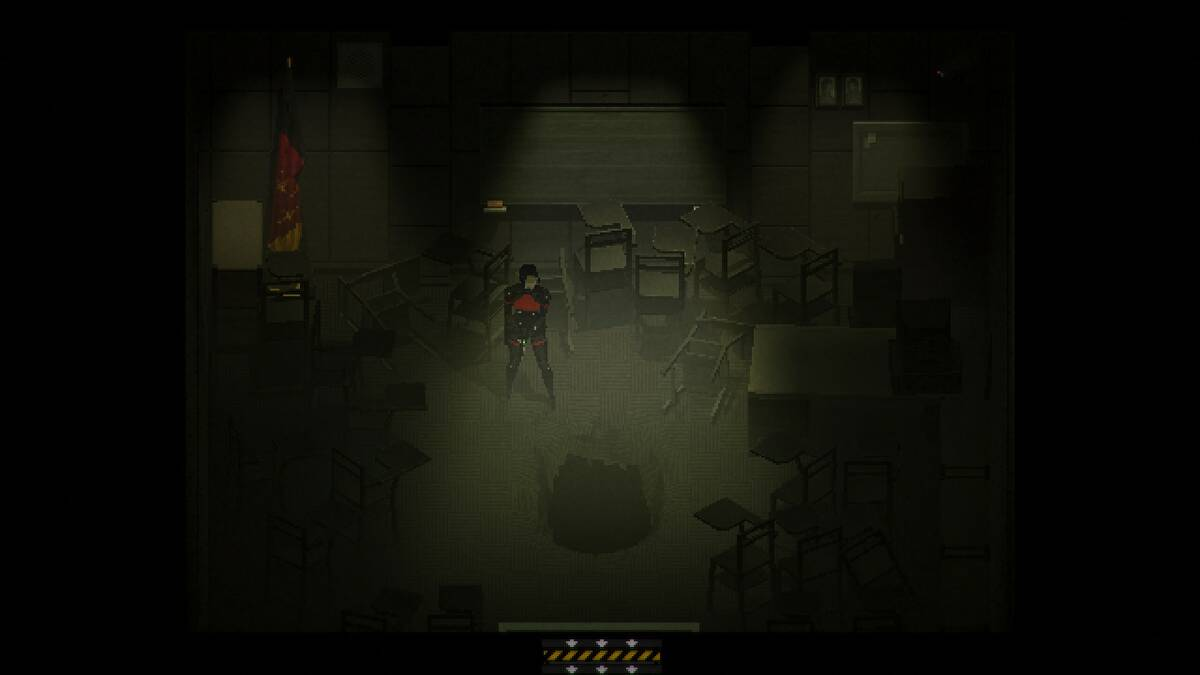The horror of Signalis: Trying to make sense of a reality that's ever-so-slightly off

At first nothing makes sense in Signalis. It's an inscrutable collection of strange places, people and ideas—a puzzle box nested inside a bigger puzzle box, heavily seasoned with robots, space colonisation, skinned nightmare creatures and complex geopolitics. It could so easily be a confusing mess. A dozen big ideas competing for space, enough to fill multiple video games. But it always returns to one simple, existentially worrying thought to tie everything together. Signalis wants you to explore the horror of things found slightly out of place. That tickle at the back of your mind telling you reality is broken, even when everything seems fine.
Horror stories frequently play with the feeling that something isn’t quite right about a situation, or that items or characters aren’t where they once were. Films insert a character who tries to tell everyone the terrible truth before it's too late, only to be seen as mad. Signalis takes that one step further, weaving the unreliable nature of reality and memory in as the key narrative theme.
You can see shades of it everywhere on the Sierpinski-23 mining facility, seeding the thoughts in our head. The main character, a Replika (essentially a robot) named Elster, searches desperately for her lost human pilot; the administrator of the facility, Adler, battles the feeling that something unnamed is not where it should be, until it drives him completely mad; the remaining Replikas roam the doomed hallways as they would have on any normal day, but now stripped of purpose and their outer shell. Everything is almost as it was, which is somehow unfathomably worse than brand new horrors.

Even the puzzles represent a yearning for some unachievable order, that things may be put back in their place after the horror jumbled them. One of the first large-scale goals Elster has in the mining facility is to get through an ominous door locked with six keys. Why the door is locked, why it looks so strange and ritualistic, or why the keys are eventually located in such improbable places isn’t especially important. What’s important is the drive that Elster and the player have to find them. I never doubted for a second that I needed to get through this door and progress deeper into the facility. Those keys belonged to the door, and they had to be returned. Perhaps then, with the keys in place, I’d figure out what was going on.
It’s a ruse, of course. Signalis is a cosmic horror, and, like all good cosmic stories, it leverages the seductive power of promising answers that never come. You go through the door and find more doors, more awful things, more questions. And another promise that if you go a little further and put a few more things back in their place you’ll find what you’re looking for.
Signalis gave me a constant, chewing need to organise and make sense of the universe that it essentially gets away with the most outlandish narrative and structural magic tricks. The game opens on a crashed spaceship where the aforementioned pilot has gone missing, and after heading outside I found nothing but a circular pit leading downwards. At the bottom of the pit there’s another, smaller hole, which leads to a bedroom containing a copy of The King in Yellow. Wait, now I'm in a mining facility infested with scary, skinless creatures. Now I'm leaping into a vertical tunnel made of flesh. Whatever happens, I was always taken along for the ride, led through the madness by that thematic heartbeat. Find out what doesn’t belong, fix it.

But maybe that’s also a trick. Signalis builds a world composed of two factions: a matriarchal Empire, and the people who broke away to form their own authoritarian communist Nation. Life in the Nation is presented as miserable and controlled by the state—although there’s no reason to assume the Empire isn’t just as bad—and the humans and Replikas who live within it are brainwashed into fearing the very idea of someone who stands out from the crowd. Workers are strictly managed every moment of their lives, trained into specific roles early on, and pamphlets scattered around Sierpinski-23 cooly explain how to deal with the specific quirks of different Replika models in order to keep them in line.
With that context, suddenly the incessant (and helpful) requirement that I work toward putting things in their place takes on a sinister tone. Find out what doesn’t belong, fix it. Keep society running as it should. Keys shouldn’t be scattered in vents and cupboards, they need to be in doors; people shouldn’t be wandering off to be creative and fall in love, they should work to help the Nation. Fear of the unknown is just fear of the ‘other’ in a spooky hat.
The most visible misplaced aspects of Signalis are its many unusual holes. As I moved through Sierpinski-23 and the game’s other locations, I frequently stumbled across a void in the simulation. The opening sequence’s mysterious pit is quickly joined by a conspicuous hole in a classroom floor, and a series of increasingly wet and organic downward portals. These gaps in reality rend the physical space they occupy, loudly announcing their irrational existence. They also offered temptation, and I experienced an interesting mix of dread and excitement whenever a new hole was revealed.

I found myself questioning the action. Why would anyone voluntarily submit to a horrifying abyss? I was hungry for more answers, more strange moments, and a way to figure out this twisted world. But they were also an anchor point in the chaos—the holes were familiar while everything else continued to get weird. With the holes, and with all its upsetting visuals and themes, Signalis does some sleight of hand with the cosmic horror trope of gaining forbidden knowledge. While most characters in eldritch tales are undone by learning too much, in Signalis the only hope lies in exposing the terrible reality.
Status quo in the Nation is absolute control and soul-shrivelling conformity, so my willingness to squeeze Elster down an endless series of fleshy tubes in pursuit of her goal is an act of rebellion. Mechanically, the game makes us complicit in this journey deeper into what makes things so rotten in the Nation. You have to go down to move on. The holes are more like surgical entry wounds, allowing us to peel away the facade and see the true horror; the screaming enemies, their exposed robot flesh covered in flimsy gauze, are the essential humanity of the Replika’s laid bare, no longer hidden under the rules and regulations of society.
Those puzzles that seemed at the beginning to be attempts to put back what had been misplaced started to feel more like ripping open new holes in the world, until there’s nothing but honest flesh. Signalis wants you to keep returning to this idea of what it means to be in the right or wrong place. It wants to interrogate the feelings of comfort that we get from the familiar and safe, as well as the discomfort of what happens when those same places and institutions are perverted.

This applies in real time, too. Events repeat themselves, and characters who notice start to lose their minds. New locations often look like twisted versions of previous rooms, or doors will begin to lead to the wrong side of connecting locations. Late in the story, rooms were suddenly blocked off by walls of pulsating meat while I moved from place to place.
Signalis ends in the middle. The protagonist becomes increasingly detached from reality, or reality becomes detached from itself, and Elster eventually dies a failure. Their cold, motionless eye stares out from the main menu screen. The oppressive, authoritarian government was right, everyone should have just behaved themselves. It doesn’t make much sense. This is another trick, and it wasn’t the last time Signalis made me feel uncomfortable and confused. The nightmare kept going, leveraging my previous knowledge to push everything a little further into the uncomfortable. You see so much more wrong with the world when you come back from the abyss.
The true endings to Signalis are superficially hopeless, like most cosmic horror. But in the overwhelming darkness and confusion of the story there’s still that driving desire to seek out the missing, misplaced and mysterious. Unlike other cosmic stories, Signalis also suggests a purpose in moving further from reality. Especially if that reality is kind of horrific. Even as it says a thousand other things along the way, it wants you to believe there’s value in being a little out of place.
* This article was originally published here
Comments